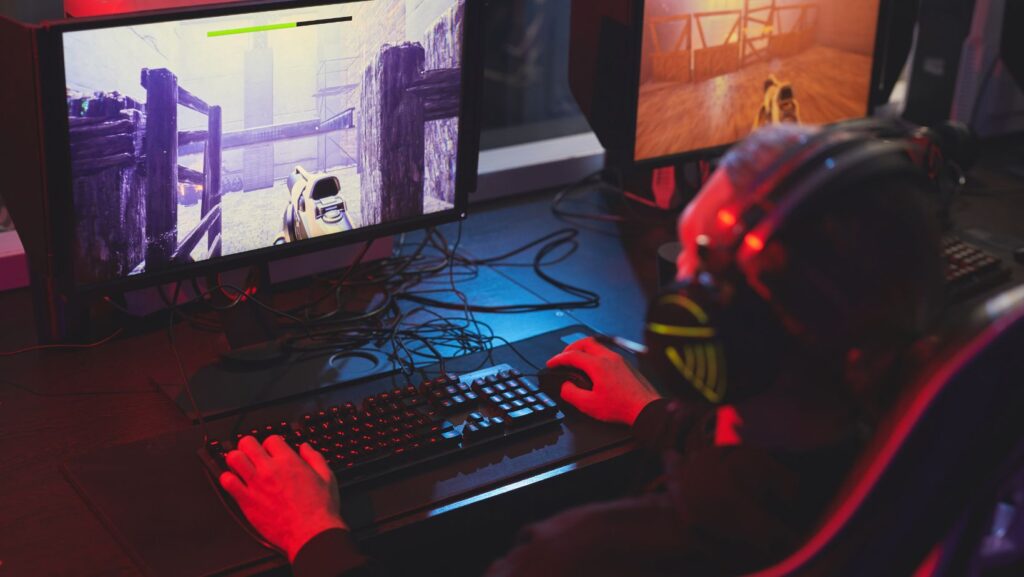In the digital age, video games have stormed into our lives, becoming a dominant form of entertainment. They’ve sparked debates among parents, educators, and psychologists about their impacts. But are they a blessing or a curse?
This article dives into the world of video games, exploring the pros and cons that have kept the world on its toes. From enhancing cognitive skills to potential addiction risks, we’ll dissect the various aspects of this popular pastime.
Video Games Pros and Cons
 To fully comprehend the impact of video games, it becomes increasingly important to understand their pros and cons. This section focuses on the benefits and potential drawbacks of playing video games.
To fully comprehend the impact of video games, it becomes increasingly important to understand their pros and cons. This section focuses on the benefits and potential drawbacks of playing video games.
Engaging in video games not only offers entertainment but also enhances cognitive abilities. Multiple studies point out that many games, particularly those involving puzzles or strategy, significantly improve problem-solving skills, with the player’s required quick decision-making abilities. Besides, video games also bolster hand-eye coordination, as seen in those who frequently play action games.
Mental dexterity isn’t the only plus. Social skills can also experience an upgrade. Multiplayer games feature interactions with other players either domestically or internationally, promoting communication, teamwork, and cultural awareness. Additionally, in a 2019 study, Oxford University found that certain games’ right duration offers a welfare enhancement, indicating a correlation between video games and improved mental wellness.Potential Drawbacks of Video Games
Despite the noted gains, video games harbor several pitfalls. The major concern arises from the addiction factor. Games are designed to be immersive, which, when unchecked, can lead to excessive play. This addiction, coupled with physical inactivity, often results in health problems, such as obesity.
Moreover, there’s a risk component tied to social aspects. While multiplayer gaming implies global connection, it can expose players to inappropriate behavior, cyberbullying, or, in severe cases, online predation, given the often anonymous nature of online interactions.
Lastly, video games—particularly violent ones—may be associated with aggressiveness. A 2017 study by the APA asserted a “consistent relation” between violent video games and heightened aggressive behavior, thoughts, and affect.
Impact of Video Games on Cognitive Skills
Video games, experts argue, significantly influence cognitive skills. They note a direct impact on problem-solving abilities, though the risk of cognitive overload exists.
With puzzles and strategic decision-making elements integral to many games, gamers frequently develop their problem-solving abilities. For example, strategy games such as Chess, Risk, or Civilization force players to think several moves ahead which inadvertently sharpens their strategic thinking and planning skills. Other games like Portal and Zelda introduce intricate puzzles and objectives, training the player’s ability to form innovative solutions.
Risks of Cognitive Overload
 A double-edged blade, video gaming presents risks of cognitive overload. It occurs when players face an excessive amount of stimuli in a short span. Particularly prevalent in fast-paced games like Fortnite or Call of Duty, cognitive overload often manifests itself when players struggle to process swiftly changing on-screen actions. Despite the potential benefit of these games in promoting cognitive flexibility, a boundary exists where the balance tips toward negative impact on cognitive function. Delving into the realm of video gaming reveals a world full of intricate social interactions and effects. This section explores the dynamics of building virtual gaming communities and the potential issues surrounding social isolation in gamers.
A double-edged blade, video gaming presents risks of cognitive overload. It occurs when players face an excessive amount of stimuli in a short span. Particularly prevalent in fast-paced games like Fortnite or Call of Duty, cognitive overload often manifests itself when players struggle to process swiftly changing on-screen actions. Despite the potential benefit of these games in promoting cognitive flexibility, a boundary exists where the balance tips toward negative impact on cognitive function. Delving into the realm of video gaming reveals a world full of intricate social interactions and effects. This section explores the dynamics of building virtual gaming communities and the potential issues surrounding social isolation in gamers.
Potential Drawbacks of Video Games
 In the world of gaming, players often find themselves forming groups or clans, creating rich, vibrant communities in the process. These virtual communities not only provide platforms for game-centric discussions but also foster companionship among players across the globe. For example, popular MMO games such as “World of Warcraft” or “Eve Online” see players banding together, strategizing in-game scenarios, or even partaking in global competitions. Importantly, these interactive environments promote cooperation – an essential people skill.
In the world of gaming, players often find themselves forming groups or clans, creating rich, vibrant communities in the process. These virtual communities not only provide platforms for game-centric discussions but also foster companionship among players across the globe. For example, popular MMO games such as “World of Warcraft” or “Eve Online” see players banding together, strategizing in-game scenarios, or even partaking in global competitions. Importantly, these interactive environments promote cooperation – an essential people skill.
However, forging these virtual relationships isn’t without its pitfalls. Cyberbullying appears as a significant concern, echoing the previously mentioned risks with multiplayer gaming. Games that allow player interactions often experience incidents of bullying, trolling, or harassment, detracting from the overall gaming experience.



